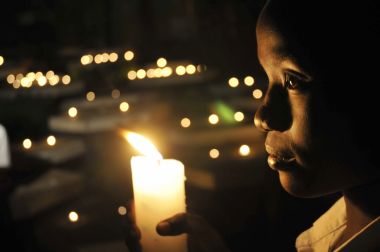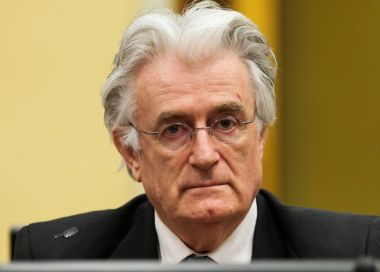Yes, ISIS really is Islamic. Now it's time for us to admit Christian crimes

Social media has given everyone who wants it a platform. And we've taken it. Opinions are churned out like cheap sausages, with a similar level of care and attention given to quality or health benefits.
Islam is a case in point. With the daily diet of terrible news from the Middle East and a stream of terrorist atrocities in the West, many of us seem to have developed into expert commentators on Islam. Except we aren't. We're mostly ignorant about Islam. So, in the aftermath of the latest incident, armies of armchair commentators demand Muslims act in a certain way in response, blame moderate Muslims for enabling extremists or even demand the curtailment of the rights of Western Muslims.
Yet online 'experts' are only aping the ignorant pronouncements of prominent figures. The range of opinions we are offered start at the bigoted, with Donald Trump arguing, "Islam hates us" right through to the naïve, with Howard Dean saying about ISIS, "I stopped calling these people Muslim terrorists. They're about as Muslim as I am."
This is why it's so important we stop just talking about Muslims and start talking to them. It's also why it's important to hear senior Muslim figures speaking out with care and with nuance. That's what the BBC's head of Religion and Ethics did this week.
Aaqil Ahmed, who's the first Muslim to hold the senior role with the Corporation, said: "I hear so many people say Isis has nothing to do with Islam — of course it has. They are not preaching Judaism. It might be wrong but what they are saying is an ideology based on some form of Islamic doctrine." He went on to further clarity his position, saying, "They [Islamic State] are Muslims. That is a fact and we have to get our head around some very uncomfortable things. That is where the difficulty comes in for many journalists, because the vast majority of Muslims won't agree with them."
This nuanced, sensible portrayal of what's happening with ISIS is essential, but so far it has seemed almost absent in the wider debate. That it comes from a Muslim is of course significant – especially one whose role is to encourage serious and sober discussion and reporting of faith issues. I only wish more of us were able to follow his lead, because it would enable us to end the phony war and look at real solutions to radicalisation and the dangers we all now face.
Ahmed is setting a standard for Muslims in public life (and for that matter on social media) to follow. But the lesson isn't just for Muslims. It's for us as Christians as well. Too many Christian commentators, especially at the conservative end of the spectrum, see Islam in a purely negative light, but more dangerously than that, they are myopic about the disastrous role Christians have played in violent conflicts.
Many of us have now come to the point where we can denounce the Inquisition, the Crusades and the Wars of Religion, while acknowledging the fact that they were intrinsically Christian. We have realised it's no use putting our heads in the sand and denying these cataclysmic events had any association with the Christian faith. They were based on a perversion of true Christianity, but their basis remains Christian. We have realised we need to own these events as 'ours', in all their gruesome reality.
The blind spots remain, though, especially on more recent conflicts. Some of the Orthodox Serbs responsible for atrocities during the war in the former Yugoslavia were Christians. Yet, very rarely are we as Christians forced to face up to what they did. In fact, there is now a large movement which seeks to deny the horrific realities such as the Srebrenica massacre. As Reuters reports, "Denial is evident outside Bosnia as well. Disparate groups, including left-leaning academics, Russian government-controlled media and some right-wing Americans who talk about a Muslim takeover, scoff at the number of 8,000 dead."
The Lord's Resistance Army, which has wreaked havoc across DRC, South Sudan, Central African Republic and Uganda, began as an offshoot of The Holy Spirit Movement. Its list of crimes is long, including murder, rape and forcing children to become soldiers. According to a profile in the Christian Science Monitor, "Though they are often portrayed as a Christian fundamentalist group bent on establishing a government in Uganda based on the Ten Commandments, religion no longer practically serves as a raison d'être for the LRA; rather it is used selectively to ensure adherence to military discipline and create an environment where commanders are respected and feared."
Their beliefs may be heterodox, but we can't simply pretend The Lord's Resistance Army isn't 'Christian.' The movement is based in Christian belief, even though we deplore its actions. What we can't do is follow the lead of Rush Limbaugh in portraying them as Christian victims.

Growing up in the UK with the backdrop of violence in Northern Ireland I became used to thinking of 'those people' as 'not Christians.' This probably helped me to separate myself from any feeling of being associated with the horrible violence committed by both Protestants and Catholics. But there were Christians involved in violence there, even if we suspect that many of those who carried out atrocities weren't practising believers.
I remember a sense of astonishment when discovering Saddam Hussein's right hand man Tariq Aziz was a Christian. How could he be a Christian and be involved with that regime? Not only was I naïve about the historic Christian communities of Iraq, I was also naïve about the way in which Christians have, sadly, been involved in horrific behaviour throughout history. I was, of course, also blind to what was coming – the 2003 invasion of Iraq, instigated by two committed Christians, George W Bush and Tony Blair. Ironically, of course, their invasion and the subsequent chaos has proved the perfect breeding ground for ISIS and other Islamist extremists.
Surely this lesson should teach us as Muslims, Christians and others to 'own' our mistakes, and indeed our crimes. Not just because it's the right thing to do, but by learning, acknowledging and owning responsibility, we can be better prepared to resist such catastrophic errors in future.
Follow Andy Walton on Twitter @waltonandy











